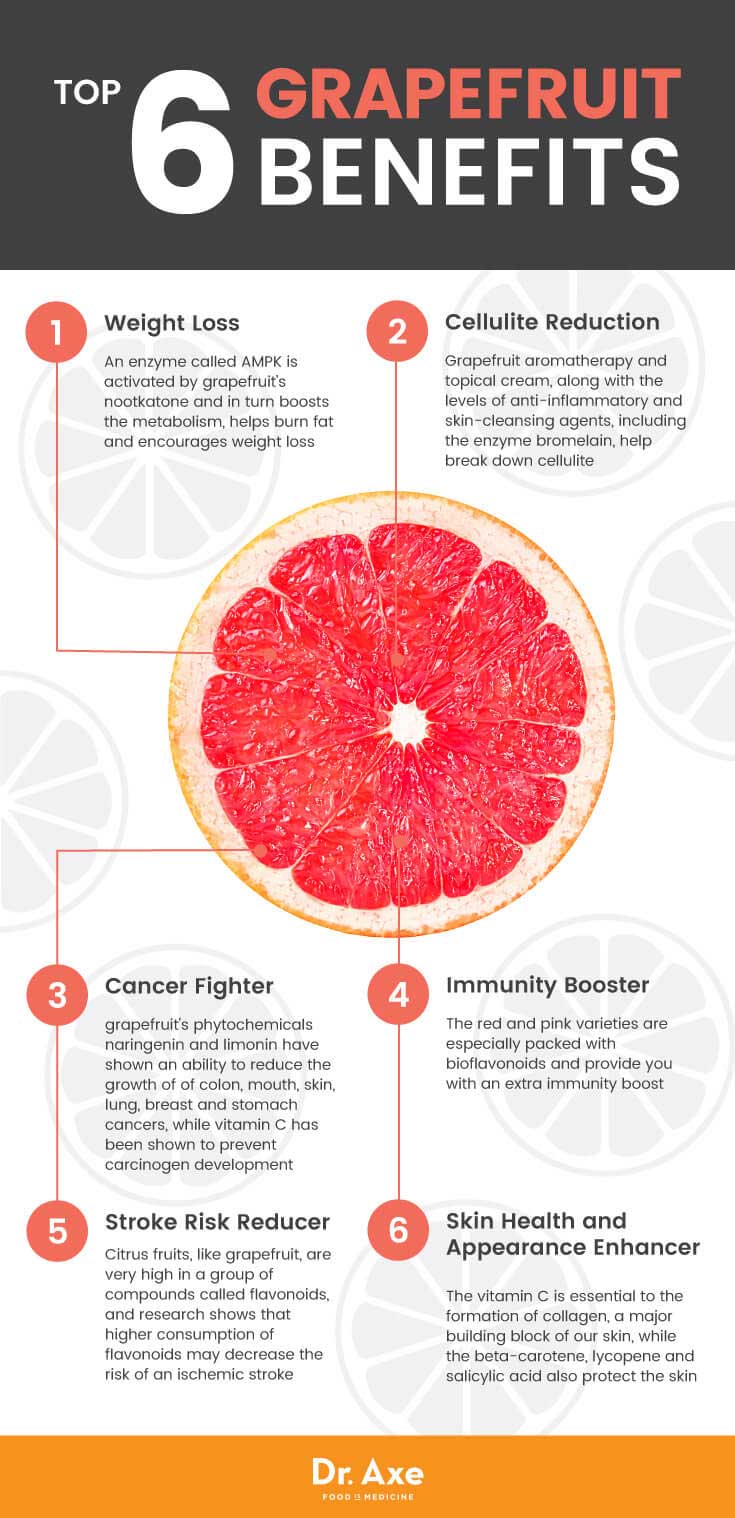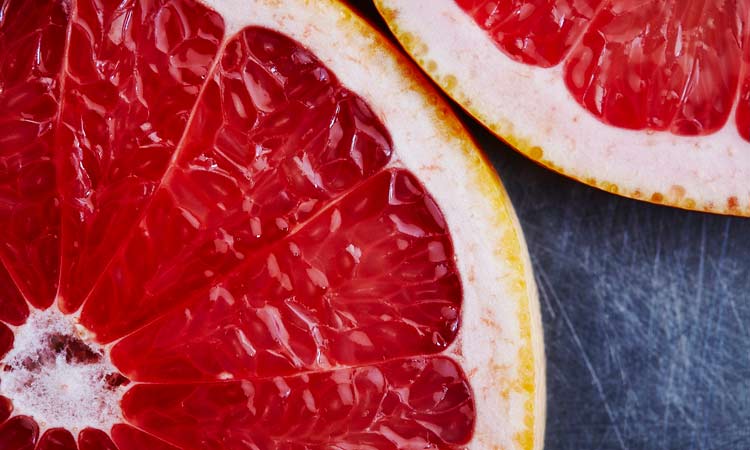How a half-a grapefruit a day can improve your overall health
Grapefruits can be white, yellow, pink or red in color with a taste ranging from sour to sweet – most often a refreshing mix of the two. Whatever color you choose, the calories in grapefruit are low, but the flavor and nutrients are high. Merely half a grapefruit each day can ensure the average adult is meeting at least half of typical vitamin C requirements, one of the reasons grapefruit benefits many areas of health.
Grapefruit also contains health-promoting phytochemicals like lycopene and beta-carotene – in the pink and red varieties – and limonoids such as limonin and flavonoids. Not surprisingly, it makes the American Institute for Cancer Research’s list of “Foods that Fight Cancer.” Plus multiple studies, including one published in the Journal of Medicinal Food, reveal that grapefruit is an extremely smart choice if you’re trying to lose weight, with only half a grapefruit per day making a significant impact on weight loss efforts.
Grapefruit has many health benefits, uses and forms. In addition to consuming the entire fruit, grapefruit juice, grapefruit essential oil and grapefruit seed extract can all be used to benefit your health.
The top 6 major grapefruit benefits
1. Weight loss
Research continues to reveal that consuming grapefruit benefits weight loss in a a major way. The key may be an enzyme called AMP-activated protein kinase (AMPK), which appears to get activated by an organic compound in grapefruit called nootkatone. When AMPK gets activated, it encourages the body’s energy-producing processes, such as glucose uptake, which helps boost metabolism. That, in turn, can encourage weight loss. AMPK is generally activated during exercise to help muscles use stored sugar and fat for energy.
An animal study published in the American Journal of Physiology-Endocrinology and Metabolism demonstrates how long-term intake of nootkatone “significantly reduced high-fat and high-sucrose diet-induced body weight gain, abdominal fat accumulation, and the development of hyperglycemia, hyperinsulinemia, and hyperleptinemia.” The study concludes that not only can grapefruit’s nootkatone likely help to prevent obesity, but it can also improve overall physical performance.
Animal studies also show that grapefruit juice beats out anti-obesity drugs when it comes to weight loss. Specifically, one study compared grapefruit juice to sibutramine, which is no longer available due to concerns about it increasing the risk for heart attack and stroke. Not only is grapefruit juice more effective for weight loss than sibutramine, but it also does not negatively affect neurotransmitters the way sibutramine did.
If the animal studies aren’t convincing enough, there have also been human studies involving the weight loss benefits of grapefruit. A study published in the Journal of Medicinal Food looked at the impact of grapefruit and grapefruit products on body weight and metabolic syndrome in 91 obese patients. Grapefruit capsules and grapefruit juice resulted in more weight loss than the placebo groups, but fresh grapefruit was definitely the star. The consumption of half a fresh grapefruit before meals was associated with significant weight loss along with improved insulin resistance.
2. Cellulite reduction
Another of the many desirable grapefruit benefits is its apparent ability to help discourage cellulite. According to the International Journal of Cosmetic Science, the primary way grapefruit can be used to reduce cellulite is through inhaling the vapor of the extract because it stimulates the nervous system by 250 percent. This grapefruit aromatherapy combined with a topical cream, which contains caffeine, can reportedly have a slimming effect.
Grapefruit also contains significant levels of anti-inflammatory and skin-cleansing agents, including the enzyme bromelain, which is known to help break down cellulite. So if you’re wondering how to get rid of cellulite, grapefruit may do the trick.
3. Cancer fighter
According to the American Institute for Cancer Research, cell and animal studies have shown that grapefruit’s phytochemicals naringenin and limonin show an ability to reduce the growth of colon, mouth, skin, lung, breast and stomach cancers. The studies also show that not only does proliferation slow down, but the highly desirable self-destruction of the cancer cells increases. It’s believed that these grapefruit compounds work in a two-pronged approach: “They decrease inflammation and increase enzymes that deactivate carcinogens.”
Grapefruit’s super start antioxidant, vitamin C, has also been shown to prevent harmful changes to DNA caused by free radicals, while also preventing carcinogen development. All this makes grapefruit one of the more effective cancer-fighting foods out there.
4. Immunity booster
With its standing among the top vitamin C foods, you’ll be hard-pressed to find someone who doesn’t agree that eating grapefruit is a healthy way to start your day. The red and pink varieties are especially packed with bioflavonoids and provide you with an extra immunity boost.
Numerous scientific studies show that all our immune system’s cells function at their peak when they get enough vitamin C on a regular basis. When these disease-fighting cells get the vitamin C they need from dietary sources such as grapefruit, these vital cells are better able to identify and successfully wipe out any invading organisms – like the ones that cause illness. Many experts agree that not getting enough vitamin C can make the human body that much more likely to contract sickness and infections.
5. Stroke risk reducer
According to a 2012 study by the American Heart Association, eating grapefruits and oranges appears to be useful in lowering the risk of a stroke, especially if you’re a woman. Citrus fruits, such as grapefruit, are very high in a group of compounds called flavonoids, and this research shows that higher consumption of flavonoids may decrease the risk of an ischemic stroke.
The study had just under 70,000 female subjects and finds that women who consumed high amounts of flavonoids in citrus fruits such as grapefruit have a 19 percent lower risk of ischemic stroke than women who consume the least amount. In addition, a prior study concludes that increased citrus fruit intake, but not intake of other fruits, lowers the risk of ischemic stroke and intracerebral hemorrhage.
6. Skin health and appearance enhancer
If you haven’t noticed, there are a variety of cosmetic and skin-cleansing products on the market these days that have grapefruit as a star ingredient. Grapefruit contains natural acids that cleanse the skin when used in skincare products. Grapefruit is loaded with vitamin C, which acts as an antioxidant to protect the skin and is also essential to the formation of collagen, a major building block of our skin. Collagen production is key when it comes to keeping skin looking youthful and wrinkle-free.
Pink grapefruit is also rich in beta-carotene, which is amazing at slowing the aging of skin cells and has been known to also improve hyperpigmentation. Skincare experts also love how pink grapefruit contains lycopene, which is known to guard against sun-induced skin damage and mutation, and general inflammation. Last but not least, grapefruit naturally contains a breakout-fighting and pore-cleansing ingredient you’ve probably heard of before: salicylic acid, making grapefruit a potential home remedy for acne.
Overall, internal and external use of grapefruit is really a double punch when it comes to your skin’s health and appearance.

This article originally appeared on DrAxe.com and is republished here with permission.
Post Disclaimer
This content is for informational purposes only and does not constitute medical advice. Please consult a healthcare professional for any medical concerns.



